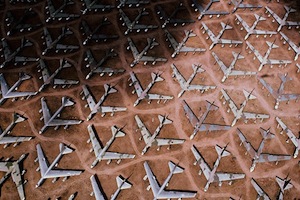amarc.jpeg [1]


The United States spends roughly $54 billion a year on nuclear weapons and related programs, with plans in place to spend roughly $10 billion more per year on new nuclear submarines, missiles, and bombers. If this massive expenditure goes through as planned, it could overshadow U.S. efforts to reduce the role and number of nuclear weapons.
The U.S. needs to bring its nuclear budgets and guidance in line with its efforts to reduce its nuclear arsenal. Daryl Kimball [2], Executive Director of the Arms Control Association [3] and Ploughshares grantee, makes this potent argument in his editorial “Trimming Nuclear Excess [4]” in this month’s issue of Arms Control Today [5]. He writes:
Maintaining and modernizing U.S. strategic forces at current, higher levels is not only unnecessary, but prohibitively expensive. If Congress and the White House are serious about reducing defense expenditures by $400 billion by 2023 to reduce the ballooning federal deficit, they should start by deferring or curtailing the Pentagon’s ambitious plan to upgrade and replace the strategic triad, which is projected to exceed $100 billion over the same period.
Current plans to replace the strategic triad of nuclear submarines, missiles, and bombers are designed to preserve the status quo – with 1,550 deployed strategic nuclear weapons once New START is implemented – through the second half of this century. We do not need that many weapons [6] to preserve our security today, let alone in 2080. Nor can we afford that many.
The U.S. Needs to Get Control of its Nuclear Budget
As Kimball suggests, the process begins with the Obama administration’s update of the decade-old presidential guidance that establishes the military's requirements for nuclear weapons. By eliminating Cold War requirements from this guidance, like the ability to launch nuclear weapons on a moment’s notice, President Obama could reorient the Pentagon toward maintaining a smaller nuclear arsenal.
This would eliminate the antiquated justifications for keeping thousands of nuclear weapons, put the U.S. on track for deep nuclear reductions, and, in the end, save perhaps hundreds of billions of dollars.
None of this will be easy. Nuclear weapons constituents [7] in Congress and the Pentagon will attempt to defend their inflated nuclear budgets to the last dime – no matter how divorced these budgets are from strategic and fiscal realities. These nuclear hawks will struggle to uphold the hypocrisy of demanding budget cuts while buying weapons we do not need at costs we cannot afford.
That is why the upper hand goes to sensible policy-makers who put the U.S. on course to achieve nuclear reductions, save cash, and improve national security.
Links
[1] https://www.ploughshares.org/file/2411
[2] http://www.armscontrol.org/about/dkimball
[3] http://www.armscontrol.org/
[4] http://www.armscontrol.org/act/2011_05/Focus
[5] http://www.armscontrol.org/epublish/1/146
[6] http://www.armscontrol.org/pdf/20071104_Drell_Goodby_07_new.pdf
[7] http://www.thebulletin.org/web-edition/features/local-priorities-vs-national-interests-arms-control